SWEDISH SOUTH ASIAN STUDIES NETWORK
Report from Aga Khan University, Karachi:
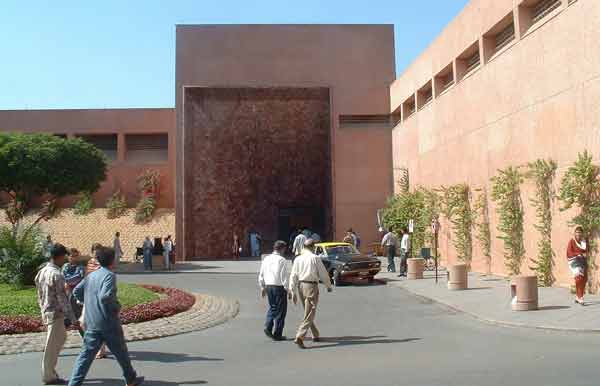 Aga
Khan University was the first private International university established
in Pakistan in 1983.
Aga
Khan University was the first private International university established
in Pakistan in 1983.
The university plays a pivotal role in the Aga Khan Developmental Network,
AKDN, which runs educational, health and social institutions in a large
number of countries around the World, especially in South Asia, Central
Asia and East Africa, areas with an important presence of Ismaili communities
for which Aga Khan is the spiritual head.
Persons we met:
Zulfiqar A. Bhutta, professor of Paediatrics,
and member of SASNET’s South Asian Reference group
David Taylor, Professor of history, Provost
of the Aga Khan University
Mohammad Khurshid, Professor of Pathology
& Medicine, Dean of the Medical College
Mehtab S. Karim, Professor of sociology,
Head Population & Reproduction Health Program, Noormahomed P. Sheriff
Professor of Demography, Department of Community Health Sciences, Faculty
of Health Sciences, Medical College
Sadrudin Pardhan, Professor & Director
of Outreach, Institute for Educational Development
Gordon Macleod, Professor and Director, Institute
for Educational Development
Reports from Staffan Lindberg’s and Lars Eklund’s visit Friday 21 November 2003
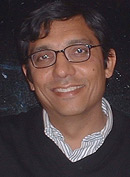 With
Zulfiqar Bhutta, who in
2001 visited Lund University and took part in SASNET’s
Workshop on Global Networking, we discussed several matters related
to SASNET. Zulfiqar Bhutta is very eager to encourage and promote increased
cooperation between Swedish and Pakistani researchers, and he feels that
SASNET has an important role to play. In July 2004 he will convene panel
no 28 of the 18th EASAS conference at Lund, something he is looking
forward to. Not the least because the Lund conference gives an opportunity
for researchers from India and Pakistan to come together.
With
Zulfiqar Bhutta, who in
2001 visited Lund University and took part in SASNET’s
Workshop on Global Networking, we discussed several matters related
to SASNET. Zulfiqar Bhutta is very eager to encourage and promote increased
cooperation between Swedish and Pakistani researchers, and he feels that
SASNET has an important role to play. In July 2004 he will convene panel
no 28 of the 18th EASAS conference at Lund, something he is looking
forward to. Not the least because the Lund conference gives an opportunity
for researchers from India and Pakistan to come together.
In the last few years it has become more and more difficult to obtain
visas to visit conferences in the neighbouring country; during the last
year Bhutta has been invited to take part in six different research conferences
in India (including the International
Seminar & Workshop on “Fermented Foods, Health Status and Social
Well-being” at the Institute of Rural Management in Anand, Gujarat,
13–14 November 2003, partly sponsored by SASNET). Twice his visa
applications have been rejected, and in the other cases a visa has been
qualified by unacceptable restrictions in the form of reporting every
step to the police.
Zulfiqar Bhutta enthusiastically informed us about a WHO sponsored Health
Sciences conference at the Maldives in August 2003, which he attended.
There Indian and Pakistani researchers in the field had an opportunity
to meet and discuss their results without any hindrances. The Lund conference
might offer a similar opportunity.
Finally he announced that he is most willing to include one of the students
from SASNET’s and Lund University’s ongoing Masters programme
in Asian Studies in his programme at Aga Khan University on women’s
health during the fall of 2004.
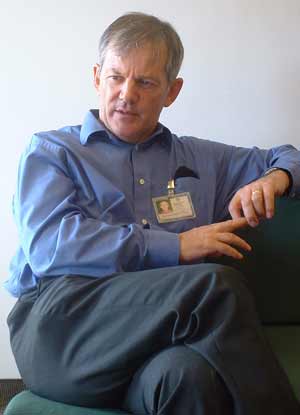 We
then met David Taylor, professor
of history and Provost of the Aga Khan University, that is, the Rector.
Taylor got his PhD in 1970 and has for many years worked at SOAS, School
of Oriental and African Studies, London University, UK, and also been
active in the British Association for
South Asian Studies, BASAS. He recently signed a contract to work
at AKU for a period of 4-5 years.
We
then met David Taylor, professor
of history and Provost of the Aga Khan University, that is, the Rector.
Taylor got his PhD in 1970 and has for many years worked at SOAS, School
of Oriental and African Studies, London University, UK, and also been
active in the British Association for
South Asian Studies, BASAS. He recently signed a contract to work
at AKU for a period of 4-5 years.
We informed him about the purpose of SASNET and our ambition to involve
more Pakistani scholars and students in the network, and how we already
are linked to Aga Khan University through the long standing relationship
between Prof. Bo Lindblad at Karolinska Institutet Medical University,
Stockholm, and the Department of Paediatrics here. David told us about
the great changes that are planned for the Aga Khan University. After
mostly keeping to Health sciences (AKU is situated in the middle of a
hospital), and since the last 10 years also to Educational development,
AKU now is going to expand its activities. A Faculty of Arts and Sciences
with interdisciplinary approach is going to be established at a new campus
area outside Karachi, giving it unlimited space for new constructions
of institutes and reserach centres. The new faculty is scheduled to be
inaugurated in 2007, and efforts are now under way to choose the architect
for the construction.
By including social sciences within the scope of AKU the ambition is to
enhance studies on the relation between health and the society, e g by
studies on Human Development, Psychology, Economic growth, and perhaps
even Journalism.
The staff at AKU is already very International, even though only few Western
expatriates like himself are staying on because of the worsened security
situation in Karachi during the last 10 years. But the faculty today consists
of members from Bangladesh, Sri Lanka, Ismailis from East Africa, and
Taylor emphasizes that a strong ambition is to encourage bright young
Pakistani PhD’s now staying overseas to return home, and he would
also like to have faculty members from India if that was possible.
Taylor also informed us about AKU’s activities in Afghanistan, including
the establishment of IMEI, the International Medical Nursing Institute;
and a scholarship programme offered to students from Afghanistan. In neighbouring
Tajikistan AKU has been heavily involved in creating a new pan-Central
Asian university high up in the Pamir mountains, University
of Central Asia at Khorog. Taylor however told us that the mood has
gone down with the project, and the planning has been taken over from
AKDN by the regional Central Asian universities.
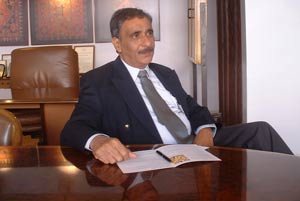 We
also had a brief meeting with Dr. Mohammad
Khurshid, Professor of Pathology & Medicine, Dean
of the Medical College (photo to the left). He told us more about
the linkage with Karolinska institutet and that it was the most important
partner for Aga Khan University besides Harvard. He emphasised the importance
of the joint PhD-programmes and that in the future the sandwich technique
could be further developed. Within Pakistan they had a joint programme
with other universities within the field of biology. He also told us that
once there had been a Pakistan-Swedish Institute at the time when there
was much development cooperation between Sweden and Pakistan.
We
also had a brief meeting with Dr. Mohammad
Khurshid, Professor of Pathology & Medicine, Dean
of the Medical College (photo to the left). He told us more about
the linkage with Karolinska institutet and that it was the most important
partner for Aga Khan University besides Harvard. He emphasised the importance
of the joint PhD-programmes and that in the future the sandwich technique
could be further developed. Within Pakistan they had a joint programme
with other universities within the field of biology. He also told us that
once there had been a Pakistan-Swedish Institute at the time when there
was much development cooperation between Sweden and Pakistan.
During lunch we met Dr. Mehtab S. Karim, Professor of sociology, who is working with the demography & health programme. His main area of research is migration, especially between India and Pakistan. He has been involved with a Masters programme on Health Policy and Management at the Aga Khan University. He expressed keen interest in participating in the EASAS conference at Lund next year, and was also interested to link up with SASNET in various ways.
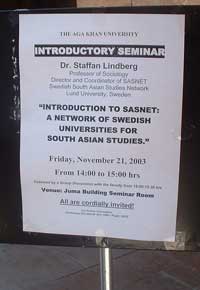 After
lunch, about 40 teachers and senior students attended a SASNET
presentation meeting, where we informed about the main
objectives of SASNET and details about our gateway and how it can be used.
We also invited people to our conference next year. There were many questions
related to the conference and to the academic environments in Sweden.
Was there an interest in South Asian languages? How come we included Afghanistan
in the network? Etc.
After
lunch, about 40 teachers and senior students attended a SASNET
presentation meeting, where we informed about the main
objectives of SASNET and details about our gateway and how it can be used.
We also invited people to our conference next year. There were many questions
related to the conference and to the academic environments in Sweden.
Was there an interest in South Asian languages? How come we included Afghanistan
in the network? Etc.
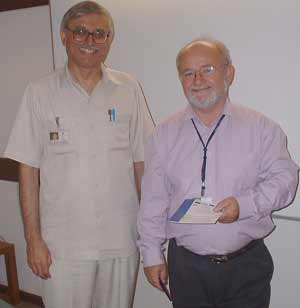 Finally
in the afternoon we had a drive across the entire city to reach the Institute
for Educational Development (IED), which is also part of the Aga Khan
University. Here we met Dr. Sadrudin Pardhan,
Professor & Director of Outreach, Institute for Educational Development
(photo, standing to the left) and Dr. Gordon
Macleod, Professor and Director, Institute for Educational
Development.
Finally
in the afternoon we had a drive across the entire city to reach the Institute
for Educational Development (IED), which is also part of the Aga Khan
University. Here we met Dr. Sadrudin Pardhan,
Professor & Director of Outreach, Institute for Educational Development
(photo, standing to the left) and Dr. Gordon
Macleod, Professor and Director, Institute for Educational
Development.
IED has an impressive array of activities, spanning from running its own
schools (primary, secondary and higher secondary), teachers training colleges
and research. The institute has been funded by the European Commission
since its inception in 1992. The staff is about 70 persons, including
several professors and 17 PhD-students registered with various universities
around the world (including Toronto and Oxford). There are Masters programmes
and they plan to start a PhD programme in 2004.
The institute operates in a wide circle around the Arabian Sea and in
ten countries, stretching in the southwest down to Tanzania (including
Zanzibar) and eastwards to Bangladesh. India is included in the programme,
but can only be linked up through Tanzania because of the visa problems
involved. The institute even runs shorter training courses for teachers
in northern Afghanistan. They have had some contacts with Pia
Karlsson and Amir Mansory from the
Institute for International Education, Stockholm University, and wish
they could develop more cooperation with them.
Sadrudin startled us by greeting us in Swedish language. It turned out
that he has a special relationship to Sweden. He was born in a Muslim
Gujarati family in Kenya, but got his higher education in Chemistry at
Uppsala University (PhD in 1969) and also a teachers training, and other
members of his family still live in Uppsala. Sadrudin however returned
to Africa, and worked in a Sida sponsored programme at Kenya Science Teachers
College for 10 years. He also spent some time in Canada before joining
the newly established IED in Pakistan in 1993.
Sadrudin Pardhan informed us about the extensive in-service programmes
and research that IDE is involved with. It has 38 faculty members, and
another 17 people engaged in research. Besides the International activities
mentioned above IDE has built centres in the northern parts of Pakistan,
in Gilgit and Chitral.
Before leaving IDE we were also introduced to the Director, Prof Gordon
MacLeod, coming from Australia.
The drive back across the city was cumbersome and took its time. This was not just any Friday, but the Jumatul Wida, and the streets were jammed with people and vehicles of all sorts coming from prayers and going to the markets to buy Eid gifts. We were extremely tired after a hectic first day in Pakistan without a proper night’s sleep after arrival.
SASNET - Swedish South Asian Studies Network/Lund
University
Address: Scheelevägen 15 D, SE-223 70 Lund, Sweden
Phone: +46 46 222 73 40
Webmaster: Lars Eklund
Last updated
2008-02-26
